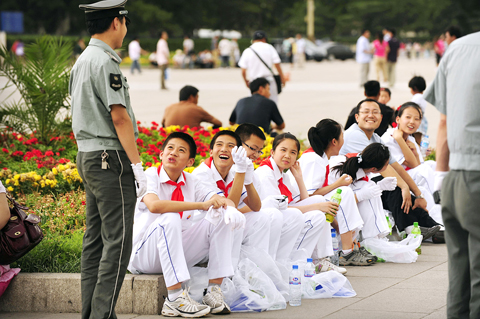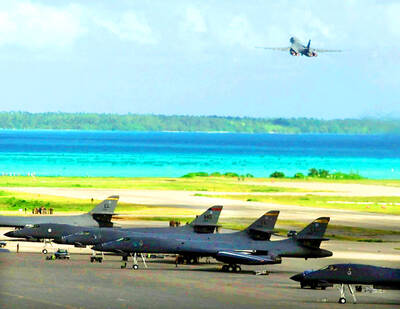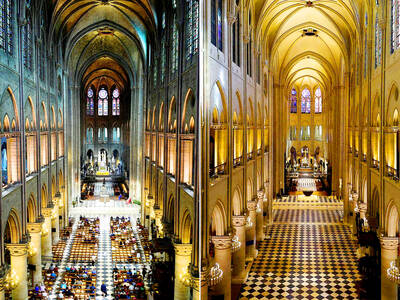Twenty years after her teenage son was shot by troops near Tiananmen Square in Beijing, Zhang Xianling (張先玲) is still trying to work out how many others died with him.
Beijing’s refusal to release an official figure for the number killed on June 4, 1989, is symbolic of its larger silence about the crackdown on student protesters.
China’s economy is now the third largest in the world, an achievement that would have been unthinkable during the impoverished 1980s. But political reform has stalled, with the Chinese Communist Party (CCP) quick to stamp out any perceived challenge.

PHOTO: AFP
“China is on the road to democracy and the rule of law, but we don’t know how long that road will be ... Before, I thought I would see the day, now I am not so sure,” Zhang said in an interview in her living room, filled with books and her husband’s musical instruments.
“Now the economy is more developed. A lot of people just chase economic advancement, and don’t worry about politics,” she said.
Zhang’s son, Wang Nan (王楠), was a cheerful, bespectacled 19-year-old when he left a note on the night of June 3 to say he was going to join friends on Tiananmen Square.
It took 10 days before his disinterred body was returned to his parents. His glasses were still on his face.
Zhang founded Tiananmen Mothers with another woman, Ding Zilin (丁子霖), whose 17-year-old son was also killed. The group is trying to make a list of the dead and urge for a reassessment of the verdict that the movement was a “counter-revolutionary” plot.
They recently confirmed one more name, bringing their list of victims to 195. Zhang believes they have only identified about one-tenth of those killed.
“Our greatest hope is to be able to openly say it was wrong for the army to fire on people. Civil society should be able to participate in an investigation,” Zhang said.
Their quest is impeded by police surveillance, the mistrust of families of the dead and the demolition of Beijing’s old alleyways, which has scattered neighbors and made families harder to track down.
The group issued a statement in the run-up to the 20th anniversary of the crackdown calling for an investigation, compensation and prosecution of those responsible.
After 20 years, the rush for wealth has become a bigger priority for most Chinese than dwelling on the past, or even pressing for greater freedoms, reformers like Zhang acknowledge.
But recent events have spawned a new generation of activist parents, seeking explanations for the deaths of thousands of schoolchildren during a devastating earthquake in Sichuan Province last year, or seeking compensation for infants who died or were sickened after drinking contaminated milk powder.
Like the Tiananmen Mothers, those parents are being followed, monitored and detained, showing the CCP is still nervous their activism could threaten its hold on power. June 4 is taboo for the Chinese media and on Sunday, the CNN feed in Beijing was cut when the Tiananmen movement was mentioned.
Six months before the anniversary, a group of Chinese intellectuals released “Charter 08,” calling for freedom of speech and multiparty elections, but such Tiananmen-era calls for reform are few and far between.
Memoirs of purged CCP chief Zhao Ziyang (趙紫陽), in which he denies the 1989 student movement was a counter-revolutionary plot, sold out when they were published in Hong Kong last month.
“History has stopped at this point. Reform has stalled,” Bao Tong (鮑彤), Zhao’s aide and the highest-ranking official jailed in the crackdown, said from his home where he is monitored by police.
“We can’t explain this to our own students, and people overseas probably understand even less. We need the government to open up and truly discuss it,” Bao said.
Zhang says her long fight to shed light on her son’s death taught her the duties of citizenship.
“After 20 years, my opinion hasn’t changed. The students were protesting against corruption ... 20 years later, we can see they were right,” Zhang said.
“Corruption is everywhere. The students were prescient,” she said.

South Korean President Yoon Suk Yeol on Tuesday declared martial law in an unannounced late night address broadcast live on YTN television. Yoon said he had no choice but to resort to such a measure in order to safeguard free and constitutional order, saying opposition parties have taken hostage of the parliamentary process to throw the country into a crisis. "I declare martial law to protect the free Republic of Korea from the threat of North Korean communist forces, to eradicate the despicable pro-North Korean anti-state forces that are plundering the freedom and happiness of our people, and to protect the free

CHAGOS ISLANDS: Recently elected Mauritian Prime Minister Navin Ramgoolam told lawmakers that the contents of negotiations are ‘unknown’ to the government Mauritius’ new prime minister ordered an independent review of a deal with the UK involving a strategically important US-UK military base in the Indian Ocean, placing the agreement under fresh scrutiny. Under a pact signed last month, the UK ceded sovereignty of the Chagos archipelago to Mauritius, while retaining control of Diego Garcia — the island where the base is situated. The deal was signed by then-Mauritian prime minister Pravind Jugnauth and British Prime Minister Keir Starmer on Oct. 3 — a month before elections in Mauritius in which Navin Ramgoolam became premier. “I have asked for an independent review of the

France on Friday showed off to the world the gleaming restored interior of Notre-Dame cathedral, a week before the 850-year-old medieval edifice reopens following painstaking restoration after the devastating 2019 fire. French President Emmanuel Macron conducted an inspection of the restoration, broadcast live on television, saying workers had done the “impossible” by healing a “national wound” after the fire on April 19, 2019. While every effort has been made to remain faithful to the original look of the cathedral, an international team of designers and architects have created a luminous space that has an immediate impact on the visitor. The floor shimmers and

‘VIOLATIONS OF DISCIPLINE’: Miao Hua has come up through the political department in the military and he was already fairly senior before Xi Jinping came to power in 2012 A member of China’s powerful Central Military Commission has been suspended and put under investigation, the Chinese Ministry of National Defense said on Thursday. Miao Hua (苗華) was director of the political work department on the commission, which oversees the People’s Liberation Army (PLA), the world’s largest standing military. He was one of five members of the commission in addition to its leader, Chinese President Xi Jinping (習近平). Ministry spokesman Colonel Wu Qian (吳謙) said Miao is under investigation for “serious violations of discipline,” which usually alludes to corruption. It is the third recent major shakeup for China’s defense establishment. China in June